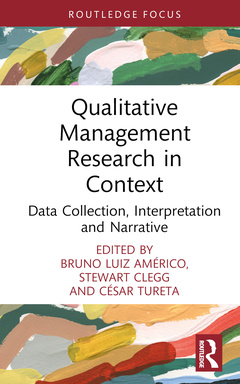Qualitative Management Research in Context Data Collection, Interpretation and Narrative Routledge Focus on Business and Management Series
Coordonnateurs : Américo Bruno, Clegg Stewart, Tureta César

This concise book uses narrative fiction to address how researchers can conduct qualitative research using both online and first-hand data and digital and face-to-face methods. The book is structured around four phases of the research process ? accessing management field research, writing the literature review, collecting and analysing data and enacting qualitative research and finally the creative process of writing qualitative research. Theory and practice are merged through a situation-based case study within each chapter, with the methods and tools employed in each context explored through narrative fiction. The protagonists of each case have specific questions, emotions and ambiguities that qualitative researchers need to face, offering a unique approach to the practice of qualitative research and how it is used in real-life situations. Founded on the idea of enacting and not just doing qualitative research, this book offers toolkits that the researcher can use to operationalize research from start to finish. It will be of interest to postgraduate students conducting research-based projects in Business and Management, PhD researchers and academics looking for a fresh approach.
Introduction: 1. Expected learning outcomes, 2. The Challenges of Qualitative Research: The Times they are a-changing, 3. The changing practice of researching qualitatively, 4. The changing realities and contexts investigated by qualitative research, 5. Fiction and other styles of writing, 6. Ethics in qualitative research, 7. The book and its chapters, 8. References. Chapter 1: Accessing fieldwork: 9. Expected learning outcomes, 10. Introduction, 11. A day at the Postgraduate Course, 12. The class on access/departure, 13. Fifteen days go fast when you are waiting for something , 14. Gathering sensitive encounters over coffee, 15. Final considerations, 16. Questions, .17 Reflective issues, 18. References. Chapter 2: Reviewing the literature, developing theory?: 19. Expected learning outcomes, 20. Introduction, 21. Traveling, searching and discovering new approaches, 22. Describing Jermier’s (1985) statements – choices, perspectives, utterances, 23. Articles using/citing the analysed text – the statements about Jermier (1985), 24. Final considerations, 25. Questions, 26. Reflective issues, 27. References. Chapter 3: Collecting and Analysing Data from Cartography of Controversies: 28. Expected learning outcomes, 29. Introduction, 30. Collecting data, 31. What are controversies?, 32. Choosing a controversy, 33. Analysing data, 34. The source of the data, 35. First moment, 36. Second moment, 37. Third moment, 38. The story of the floats’ controversies, 39. Act I: Everything appears perfect - but not everything is as it appears to be …, 40. Act II: It is all over now, 41. Act III: Lucky shot, 42. Final considerations, 43. Reflective issues, 44. References. Chapter 4: Writing: theorizing aesthetically on inclusion: 45. Expected learning outcomes, 46. Introduction, 47. A class in two stages, 48. Final considerations, 49. Questions, 50. Reflective issues, 51. References. Conclusion: Imagination and Creativity in Qualitative Research: 52. Introduction, 53. Facing challenges in enacting qualitative research, 54. Creative writing, 55. Accessing fieldwork, 56. Reviewing the literature, 57. Collecting and analysing data, 58. Writing reports, 59. Final Considerations, 60. Active Practicing , 61. References. Index.
Bruno Luiz Américo has a Ph.D. in Management from the Federal University of Espírito Santo, Brazil.
Stewart Clegg is Professor in the School of Project Management and the John Grill Institute of Project Leadership at the University of Sydney, Australia. In addition, he holds Visiting Professorship at the University of Stavanger Business School, Norway; the University of Johannesburg Business School, South Africa and Nova School of Business and Economics, Carcavelos, Portugal. In addition, he is an Emeritus Professor at the University of Technology Sydney.
César Tureta is Professor of Organization Studies at the Federal University of Espírito Santo, Brazil.
Date de parution : 08-2022
13.8x21.6 cm
Thèmes de Qualitative Management Research in Context :
Mots-clés :
Qualitative research; Fieldwork; Data; analysis; controversy; literature review; data collection; Qualitative Management Research; Exemplary Publications; Narrative Fiction; Exemplary Research; Violated; Negotiating Access; Samba School; Deaf People; Deaf Students; Ethnographic Fiction; Tamar Project; Carnival Production; Socio-material Realities; Parade Day; Radical Organization Theory; Objective Human Activity; Rio Doce; Professional High School; Fieldwork Notes; Brazilian Sign; Act III; Atmospheric Aerosol Loading; Waiting Area
